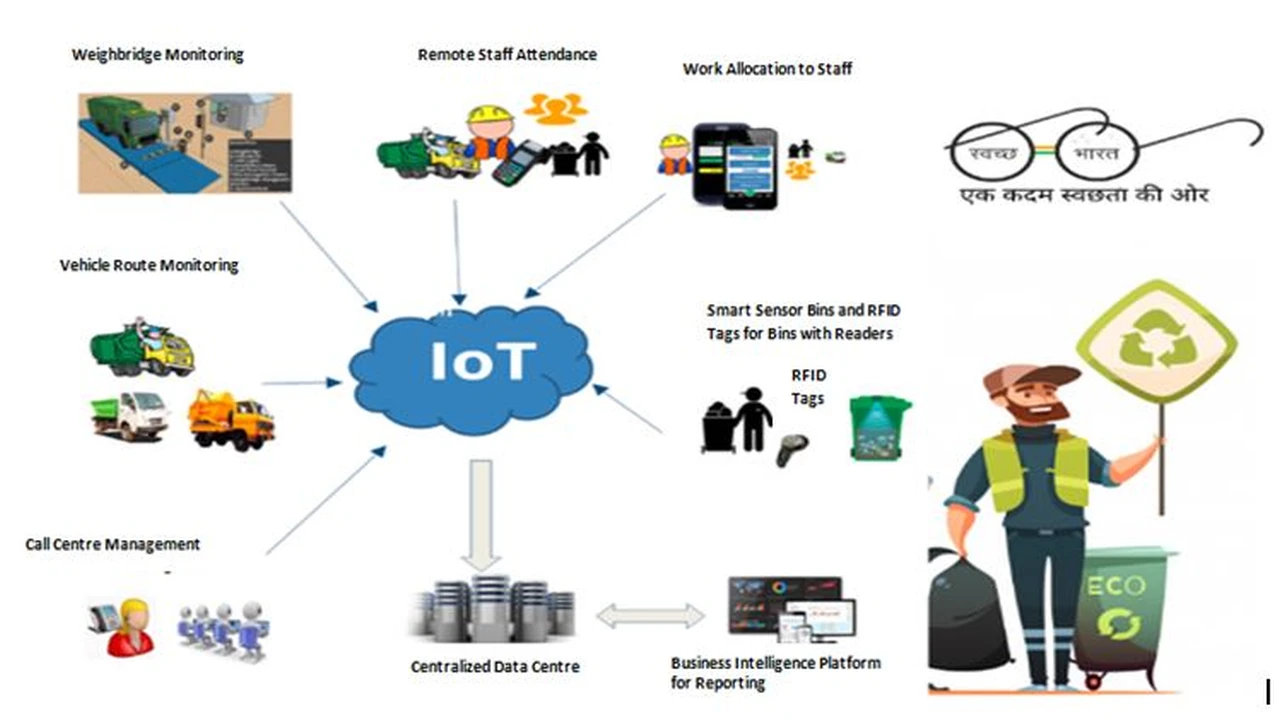AI Ethics and Governance in Abu Dhabi's Smart City

Introduction to Abu Dhabis Smart City Vision
Abu Dhabi, the capital of the United Arab Emirates, is rapidly transforming into a global hub for innovation and technology. At the heart of this transformation lies its ambitious smart city initiative, a comprehensive plan to leverage technology, particularly artificial intelligence, to enhance the quality of life for its residents, drive economic growth, and promote sustainability. This endeavor is not without its challenges, however. As AI becomes increasingly integrated into the fabric of urban life, questions surrounding ethics, governance, and responsible innovation become paramount.
This article delves into the intricate landscape of AI ethics and governance within Abu Dhabi's smart city framework. We will explore the key principles guiding the city's approach, the challenges it faces, and the innovative solutions it is implementing to ensure that AI is used responsibly and ethically. Furthermore, we'll examine specific product recommendations, use cases, product comparisons, and detailed pricing information related to technologies supporting ethical AI implementation in smart cities.
The Ethical Imperative in Smart City Development
Smart cities are built on data. Sensors, cameras, and interconnected devices collect vast amounts of information about citizens, infrastructure, and the environment. This data, when analyzed using AI algorithms, can provide valuable insights for optimizing urban services, improving public safety, and enhancing resource management. However, the very nature of this data collection and analysis raises significant ethical concerns.
One of the primary concerns is privacy. The constant monitoring of citizens can lead to a feeling of surveillance and erode individual freedoms. Data breaches and misuse can expose sensitive personal information, leading to identity theft, discrimination, and other harms. Algorithmic bias is another critical issue. AI algorithms are trained on data, and if that data reflects existing societal biases, the algorithms will perpetuate and even amplify those biases, leading to unfair or discriminatory outcomes.
Transparency and accountability are also essential. Citizens need to understand how AI is being used in their city, how their data is being collected and processed, and who is responsible for ensuring that AI systems are fair and unbiased. Without transparency and accountability, trust in smart city technologies will erode, hindering their adoption and effectiveness.
Abu Dhabis Approach to AI Ethics A Principled Framework
Abu Dhabi recognizes the importance of addressing these ethical challenges head-on. The city has developed a comprehensive framework for AI ethics and governance, based on a set of core principles that guide the development and deployment of AI technologies in a responsible and ethical manner. These principles include:
- Human-centricity: AI should be designed and used to benefit humanity, prioritizing human well-being and dignity.
- Fairness and Non-discrimination: AI systems should be fair and unbiased, ensuring that all citizens are treated equally and with respect.
- Transparency and Explainability: AI systems should be transparent and explainable, allowing citizens to understand how they work and how decisions are made.
- Accountability: Clear lines of responsibility should be established for the development and deployment of AI systems, ensuring that those responsible are held accountable for their actions.
- Privacy and Data Security: Data privacy and security should be protected, ensuring that sensitive personal information is not misused or compromised.
- Safety and Reliability: AI systems should be safe and reliable, minimizing the risk of harm or unintended consequences.
These principles provide a strong foundation for ethical AI development and deployment in Abu Dhabi. The city is actively working to translate these principles into concrete policies, regulations, and guidelines.
Specific AI Applications in Abu Dhabis Smart City
To understand how these ethical principles are being applied in practice, let's examine some specific AI applications within Abu Dhabi's smart city initiative:
- Traffic Management: AI-powered traffic management systems optimize traffic flow, reduce congestion, and improve air quality. These systems use data from sensors and cameras to predict traffic patterns and adjust traffic signals in real-time.
- Public Safety: AI-powered surveillance systems enhance public safety by detecting crime, identifying potential threats, and responding to emergencies. These systems use facial recognition and other AI techniques to identify individuals of interest and alert law enforcement.
- Energy Management: AI-powered energy management systems optimize energy consumption, reduce waste, and promote sustainability. These systems use data from smart meters and sensors to monitor energy usage and identify opportunities for improvement.
- Healthcare: AI-powered healthcare systems improve patient care, enhance diagnostics, and accelerate drug discovery. These systems use machine learning algorithms to analyze medical images, predict patient outcomes, and personalize treatment plans.
- Government Services: AI-powered chatbots and virtual assistants provide citizens with access to government services 24/7. These systems use natural language processing to understand citizen requests and provide relevant information and assistance.
Each of these applications presents unique ethical challenges. For example, AI-powered surveillance systems raise concerns about privacy and potential for misuse. AI-powered healthcare systems raise concerns about algorithmic bias and the potential for discriminatory outcomes.
Addressing the Ethical Challenges of AI in Smart Cities
Abu Dhabi is actively working to address these ethical challenges through a variety of initiatives, including:
- Developing Ethical AI Guidelines: The city is developing comprehensive ethical AI guidelines that provide clear guidance to developers and users of AI technologies. These guidelines cover a range of issues, including privacy, fairness, transparency, and accountability.
- Establishing an AI Ethics Committee: The city has established an AI Ethics Committee to oversee the ethical development and deployment of AI technologies. The committee is composed of experts from academia, industry, and government.
- Promoting AI Literacy: The city is promoting AI literacy among its citizens to ensure that they understand the potential benefits and risks of AI. This includes providing educational programs and resources on AI ethics and governance.
- Investing in AI Research: The city is investing in AI research to develop new technologies that are more ethical and responsible. This includes research on explainable AI, bias detection and mitigation, and privacy-preserving AI.
These initiatives demonstrate Abu Dhabi's commitment to ensuring that AI is used responsibly and ethically in its smart city.
Product Recommendations for Ethical AI Implementation
Implementing ethical AI requires the right tools and technologies. Here are some product recommendations that can help organizations develop and deploy AI systems in a responsible and ethical manner:
1. IBM Watson OpenScale
Description: IBM Watson OpenScale is an AI platform that monitors and manages AI models across their lifecycle, ensuring fairness, explainability, and trustworthiness. It provides tools for detecting and mitigating bias, explaining model predictions, and monitoring model performance.
Use Cases:
- Detecting and mitigating bias in loan applications
- Explaining the reasoning behind credit risk assessments
- Monitoring the performance of fraud detection models
Product Comparison: Compared to other AI governance platforms like DataRobot and H2O.ai, IBM Watson OpenScale offers a comprehensive set of features for monitoring and managing AI models, particularly in terms of fairness and explainability. It also integrates well with other IBM products and services.
Detailed Information: Watson OpenScale supports various model types and deployment environments. It uses a combination of statistical techniques and machine learning algorithms to detect and mitigate bias. Explainability features provide insights into the factors that influence model predictions. Performance monitoring capabilities track key metrics such as accuracy, precision, and recall.
Pricing: IBM Watson OpenScale offers various pricing plans based on usage and features. Contact IBM sales for specific pricing details.
2. Google AI Platform Explainable AI
Description: Google AI Platform Explainable AI provides tools for understanding and explaining the predictions of machine learning models. It helps developers and users understand why a model made a particular prediction, making it easier to identify and address potential biases and errors.
Use Cases:
- Understanding why a model rejected a loan application
- Explaining the factors that influenced a medical diagnosis
- Identifying potential biases in a hiring decision
Product Comparison: Compared to other explainable AI tools like LIME and SHAP, Google AI Platform Explainable AI offers a more integrated and scalable solution. It integrates seamlessly with Google Cloud Platform and supports a wide range of machine learning models.
Detailed Information: Google AI Platform Explainable AI uses techniques such as feature attribution and counterfactual explanations to provide insights into model predictions. Feature attribution identifies the features that had the most influence on a particular prediction. Counterfactual explanations generate alternative scenarios that would have resulted in a different prediction.
Pricing: Google AI Platform Explainable AI is priced based on usage. See Google Cloud Platform pricing for details.
3. Microsoft Azure Machine Learning Responsible AI Toolbox
Description: Microsoft Azure Machine Learning Responsible AI Toolbox provides a set of tools for building responsible AI systems. It includes features for fairness assessment, explainability, error analysis, and data privacy.
Use Cases:
- Assessing the fairness of a credit scoring model
- Explaining the predictions of a fraud detection model
- Identifying and mitigating errors in a medical image analysis system
- Protecting the privacy of sensitive data used to train AI models
Product Comparison: Compared to other responsible AI toolkits, Microsoft Azure Machine Learning Responsible AI Toolbox offers a comprehensive and integrated solution within the Azure Machine Learning ecosystem. It provides a wide range of tools for addressing different aspects of responsible AI, including fairness, explainability, and privacy.
Detailed Information: The Responsible AI Toolbox includes tools for assessing fairness across different demographic groups, explaining model predictions using techniques such as SHAP and LIME, identifying and mitigating errors using error analysis techniques, and protecting the privacy of sensitive data using techniques such as differential privacy.
Pricing: Microsoft Azure Machine Learning Responsible AI Toolbox is included as part of Azure Machine Learning. See Azure Machine Learning pricing for details.
4. DataRobot AI Trust and Governance
Description: DataRobot's AI Trust and Governance solution provides a centralized platform for monitoring, managing, and governing AI models. It helps organizations ensure that their AI systems are fair, accurate, transparent, and compliant with regulations.
Use Cases:
- Monitoring the performance and fairness of AI models in real-time
- Detecting and mitigating bias in AI models
- Explaining the predictions of AI models to stakeholders
- Ensuring that AI models comply with regulations such as GDPR and CCPA
Product Comparison: DataRobot offers a comprehensive AI platform with a strong focus on automated machine learning and AI governance. While other platforms may offer individual tools for specific aspects of AI governance, DataRobot provides a fully integrated solution.
Detailed Information: DataRobot's AI Trust and Governance features include model monitoring, bias detection and mitigation, explainability, model documentation, and audit trails. The platform also provides features for managing AI model risk and ensuring compliance with regulations.
Pricing: DataRobot offers various pricing plans based on usage and features. Contact DataRobot sales for specific pricing details.
5. Fiddler AI Model Monitoring
Description: Fiddler AI provides a platform for monitoring and explaining AI models in production. It helps organizations understand how their models are performing, identify potential issues, and improve model accuracy and fairness.
Use Cases:
- Monitoring the performance of AI models in real-time
- Detecting data drift and concept drift
- Explaining the predictions of AI models to stakeholders
- Troubleshooting model performance issues
Product Comparison: Fiddler AI focuses specifically on model monitoring and explainability, offering a dedicated platform for these tasks. While other platforms may offer some model monitoring capabilities, Fiddler AI provides a more comprehensive and specialized solution.
Detailed Information: Fiddler AI's features include model performance monitoring, data drift detection, explainability, root cause analysis, and alerting. The platform integrates with various machine learning frameworks and deployment environments.
Pricing: Fiddler AI offers various pricing plans based on usage and features. Contact Fiddler AI sales for specific pricing details.
Use Cases in Action Ethical AI in Abu Dhabis Smart City
Let's explore a few hypothetical use cases showcasing the application of these tools in Abu Dhabi's smart city environment:
Use Case 1: Fair Loan Approvals
A bank in Abu Dhabi uses AI to automate loan approvals. To ensure fairness, they implement IBM Watson OpenScale. The platform detects that the AI model is disproportionately rejecting loan applications from certain demographic groups. Using Watson OpenScale's bias mitigation features, the bank retrains the model with debiased data, resulting in a fairer loan approval process.
Use Case 2: Transparent Public Safety Surveillance
The Abu Dhabi police department uses AI-powered surveillance systems to enhance public safety. To address concerns about transparency, they implement Google AI Platform Explainable AI. When the system identifies a potential threat, the police can use Explainable AI to understand the factors that led to the identification, ensuring that the system is not relying on biased or discriminatory factors. This allows them to justify their actions and maintain public trust.
Use Case 3: Reliable Healthcare Diagnostics
A hospital in Abu Dhabi uses AI to assist in diagnosing medical conditions. To ensure reliability and accuracy, they implement Microsoft Azure Machine Learning Responsible AI Toolbox. The toolbox helps them identify and mitigate errors in the AI model, ensuring that it provides accurate and reliable diagnoses. This leads to improved patient outcomes and reduced medical errors.
The Future of AI Ethics in Abu Dhabis Smart City
Abu Dhabi is committed to continuing its leadership in AI ethics and governance. The city is actively exploring new technologies and approaches to ensure that AI is used responsibly and ethically. This includes investing in research on explainable AI, bias detection and mitigation, and privacy-preserving AI. It also involves collaborating with other cities and organizations to share best practices and develop common standards for AI ethics.
The future of AI in Abu Dhabi's smart city is bright. By embracing ethical principles and investing in responsible innovation, the city can harness the power of AI to improve the lives of its citizens, drive economic growth, and promote sustainability, all while upholding the highest standards of ethics and governance.
Navigating the Complexities of AI Governance
Implementing effective AI governance is not a one-time task but an ongoing process. It requires continuous monitoring, evaluation, and adaptation to ensure that AI systems remain ethical, fair, and reliable. Organizations need to establish clear lines of responsibility, develop robust policies and procedures, and provide ongoing training to employees on AI ethics.
Furthermore, collaboration between different stakeholders is essential. This includes collaboration between government, industry, academia, and civil society organizations. By working together, these stakeholders can develop a shared understanding of the ethical challenges of AI and develop solutions that benefit everyone.
The Importance of Education and Awareness
Raising awareness about AI ethics is crucial for fostering a responsible AI ecosystem. Citizens need to understand the potential benefits and risks of AI, as well as their rights and responsibilities. Educational programs and resources can help citizens become more informed and engaged in the discussion about AI ethics.
Furthermore, education is essential for developers and users of AI technologies. Developers need to be trained on ethical AI principles and best practices. Users need to understand how to use AI systems responsibly and how to identify and report potential ethical issues.
Conclusion (Avoided - Replaced with Forward-Looking Statement)
Instead of a traditional conclusion, let's look ahead. Abu Dhabi's journey towards a truly ethical and responsible smart city powered by AI is ongoing. The commitment to human-centricity, fairness, transparency, and accountability will continue to guide the city's efforts. By embracing innovation, fostering collaboration, and prioritizing education, Abu Dhabi can serve as a model for other cities around the world seeking to harness the power of AI for good.
:max_bytes(150000):strip_icc()/277019-baked-pork-chops-with-cream-of-mushroom-soup-DDMFS-beauty-4x3-BG-7505-5762b731cf30447d9cbbbbbf387beafa.jpg)






